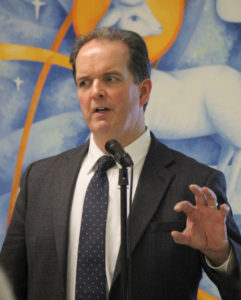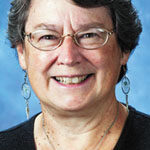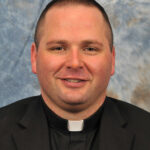By Barb Arland-Fye
The Catholic Messenger
If you look at Creation as a gift from God it changes everything, says Jim Ennis, executive director of Catholic Rural Life, who presented a workshop April 11 in Centerville on the intersection between ecology and faith.

Jim Ennis, executive director of Catholic Rural Life, speaks on ecology and faith during an event at St. Mary Parish in Centerville April 11.
Many people, however, take Creation for granted which has led to the ecological crisis that exists today. Ennis identified areas tied into ecology that aren’t often approached from a faith perspective, such as agriculture. “We focused on agriculture because of where I was speaking and what Catholic Rural Life is about,” said Ennis, referring to the nonprofit organization dedicated to the vitality of the American countryside.
But this wasn’t a workshop aimed at criticizing farmers and their agricultural practices. “I underscored that the church affirms the important role that farmers play and that families play in agriculture,” Ennis said. “The church also strongly encourages farmers to be good stewards of Creation and to be generous … the Catholic church is concerned about feeding the world, but doing it in a way so that continues to sustain family farms into the future.”
With participants of the workshop sponsored by Missionaries of the Precious Blood, Kansas City Province, Ennis explored the ecological concerns and how Catholic teaching applies to them. During the second half of the daylong workshop, participants looked at “what can we do about it.”
The solutions encompass personal responsibility, community and corporate responsibility, Ennis said. He used the issue of water pollution as an example. Nutrients from agriculture run into the Mississippi River and down to the Gulf of Mexico, creating a “dead zone” that starves aquatic life. This runoff also impacts drinking water and recreational uses of the river.
Land grant universities such as Iowa State University have shown how buffer strips and cover crops significantly reduce nutrients emptying into streams and rivers, Ennis said. The challenge: when crop prices are high, the incentive to engage in conservation measures drops.
“It costs farmers more to move those strips into conservation practices versus planting corn or soybeans … farmers are trying to make a living, and a good living,” Ennis continued. In addition, the trend toward larger and larger farms has brought about intensive agricultural practices. “What we’re seeing is real challenges to the environment as these operations get larger and larger.”
One way to deal with these challenges is through the five-year Farm Bill, the latest approved last year. It did not contain the level of funding for conservation measures that Catholic Rural Life hoped for. Ennis encourages people of faith to voice their concerns with congressional representatives about supporting conservation measures. The same can be done at the state level, when legislators deal with environmental issues.
Things that individuals can do incrementally include thinking twice about the herbicides applied to their lawns or toxic chemicals used to kill noxious plants. Become more informed about how food is grown and what chemicals are applied to it. What antibiotics are given to cattle or poultry? These are questions that could be posed to grocers. “It’s about being willing to take a risk to ask good questions … if we say nothing and do nothing, than nothing will change.”
Planting a garden is another way to make a difference. “You begin to reconnect with nature,” Ennis said. “One of the big problems in our society is that we’ve become disconnected from nature. We’re not as close to the land as we have been in the past.”
The resulting disconnection has led to treating resources as if they are infinite, he said. The mistaken idea of unconditional dominion over Creation as a right “dismisses the responsibility to care for it in the way that enables sustaining the land and water for future generations,” Ennis added.
“Christian teaching is that creation is a gift given to men and women to till and to keep … these resources need to be cared for because they’re not infinite.”
Secularists argue that overpopulation is the problem and blame Christians for the idea of dominion over the earth. Instead, it’s the lack of proper stewardship of the land and water and “our misconception of the understanding of the natural world” that harms Creation, Ennis said.
The Compendium of the Social Doctrine of the Church, published in 2004 by the Pontifical Council for Justice and Peace explores stewardship of Creation. Caring for Creation “is part of our Christian responsibility. It’s a witness to those around us.”
Ennis encourages people of faith to work with their parishes and dioceses on ecological issues. “We rarely hear from the pulpit on faith and ecology.”
He’s encouraged that Pope Francis will release his encyclical on human ecology sometime this summer. The writings of popes on important issues of the day “are modern love letters – to address modern-day problems,” Ennis said. “Pope Francis is trying to communicate in love why these particular concerns about ecology are important and what we can do about it.”
Kent Ferris, the Diocese of Davenport’s Social Action director, was among participants at the Centerville workshop. “As Jim shared with us, care for creation implies a Creator and that distinguishes us from folks who are concerned about ecology by itself.
“I also appreciated his comment that “…stewardship is our response to God…” a response to the gift of Creation that is for all of us. In turn, I am to live less as a consumer of resources and more as someone who is willing to share all that God has created for us.”
Workshop addresses Creation
Brother Daryl Charron, social justice director for the Kansas City province of the Missionaries of the Precious Blood, said Catholic Rural Life “really addresses ecological issues well, and farming practices and care of the earth.” He said the ecology workshop held April 11 at St. Mary Parish in Centerville was a way to celebrate the bicentennial of Missionaries of the Precious Blood and to demonstrate that “social justice is an important part of our ministry as missionaries.”











